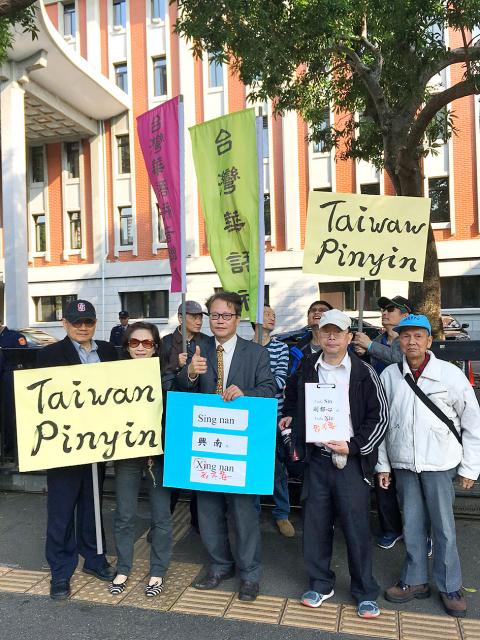A number of pro-localization groups yesterday rallied in front of the Ministry of Education in Taipei to protest against the government’s adoption of the Hanyu pinyin romanization system for translations of station names along the MRT line between Taiwan Taoyuan International Airport and Taipei Main Station, calling on the Democratic Progressive Party government to reinstitute its former policy of pushing for nationwide implementation of Tongyong pinyin.
The protesters called on the ministry, the governing body for the nation’s languages, to abandon the Hanyu system adopted by former president Ma Ying-jeou (馬英九) and reinstate the Tongyong system, which was promulgated in 2002 as the nation’s standard Mandarin romanization system.
Although the International Organization for Standardization (ISO) identifies Taiwan as a province of China, the organization uses the Tongyong system when referring to places in Taiwan, Taiwan Mandarin Romanization Alliance convener Yu Bor-chuan (余伯泉) said.

Photo: Sean Lin, Taipei Times
“For example, the ISO 3166 standard does not spell Kaohsiung as ‘Gaoxiong,’ just as it retained the spelling for Hong Kong, rather than ‘Xianggang,’ after the territory was handed over to China in 1997,” Yu said.
In addition, the ISO 7098 standard states that Hanyu pinyin is “the official language of the People’s Republic of China,” of which Taiwan is not a part, so the version of Mandarin used by Taiwanese does not fall within that scope, Yu said, adding that Ma led the nation down a path of “suicide” when he submitted to China and made Hanyu pinyin the national standard.
The administration of President Tsai Ing-wen (蔡英文) could have readopted Tongyong pinyin as the nation’s official romanization system after it took office, but it has instead treated the issue with indifference; essentially restricting itself to a framework set by Ma, he said.
As Taiwan’s culture and people have diverse origins, Taiwanese have formed a language that is uniquely Taiwanese, Taiwan Frontier convener Hong Hsien-cheng (洪顯政) said.
“The Mandarin used in Taiwan sounds different from that used in China and should have an independent system, just as British English is different from American English,” he said.
The nation’s use of Hanyu pinyin should not be made a political issue, ministry National Language Education Promotion Office head Wu Chung-yi (吳中益) said.
“The romanization used on road signs and at transportation stations is intended for foreigners... Every foreigner learning Mandarin learns Hanyu pinyin, because it is the international standard,” Wu said. “The decision has nothing to do with the nation’s self-determination or any ideologies, because the key point is to ensure that foreigners can read signs.”
“It is impossible to reason with the groups, as they are bent on politicizing the matter,” he added.

The Grand Hotel Taipei on Saturday confirmed that its information system had been illegally accessed and expressed its deepest apologies for the concern it has caused its customers, adding that the issue is being investigated by the Ministry of Justice Investigation Bureau. The hotel said that on Tuesday last week, it had discovered an external illegal intrusion into its information system. An initial digital forensic investigation confirmed that parts of the system had been accessed, it said, adding that the possibility that some customer data were stolen and leaked could not be ruled out. The actual scope and content of the affected data

DO THEY BITE IT? Cats have better memories than people might think, but their motivation is based entirely around the chance of getting fed Cats can remember the identity of the people who fed them the day before, Taipei-based veterinarians said on Friday, debunking a popular myth that cats have a short memory. If a stray does not recognize the person who fed them the previous day, it is likely because they are not carrying food and the cat has no reason to recognize them, said Wu Chou Animal Hospital head Chen Chen-huan (陳震寰). “When cats come to a human bearing food, it is coming for the food, not the person,” he said. “The food is the key.” Since the cat’s attention is on the food, it

‘LIKE-MINDED PARTNER’: Tako van Popta said it would be inappropriate to delay signing the deal with Taiwan because of China, adding he would promote the issue Canadian senators have stressed Taiwan’s importance for international trade and expressed enthusiasm for ensuring the Taiwan-Canada trade cooperation framework agreement is implemented this year. Representative to Canada Harry Tseng (曾厚仁) in an interview with the Central News Agency (CNA) said he was increasingly uneasy about Ottawa’s delays in signing the agreement, especially as Ottawa has warmed toward Beijing. There are “no negotiations left. Not only [is it] initialed, we have three versions of the text ready: English, French and Mandarin,” Tseng said. “That tells you how close we are to the final signature.” Tseng said that he hoped Canadian Prime Minister Mark Carney

President William Lai (賴清德) yesterday bestowed one of Taiwan’s highest honors on Saint Vincent and the Grenadines (SVG) Ambassador Andrea Clare Bowman in recognition of her contributions to bilateral ties. “By conferring the Order of Brilliant Star with Grand Cordon on Ambassador Bowman today, I want to sincerely thank her, on behalf of the Taiwanese people, for her outstanding contribution to deepening diplomatic ties between Taiwan and SVG,” Lai said at a ceremony held at the Presidential Office in Taipei. He noted that Bowman became SVG’s first ambassador to Taiwan in 2019 and